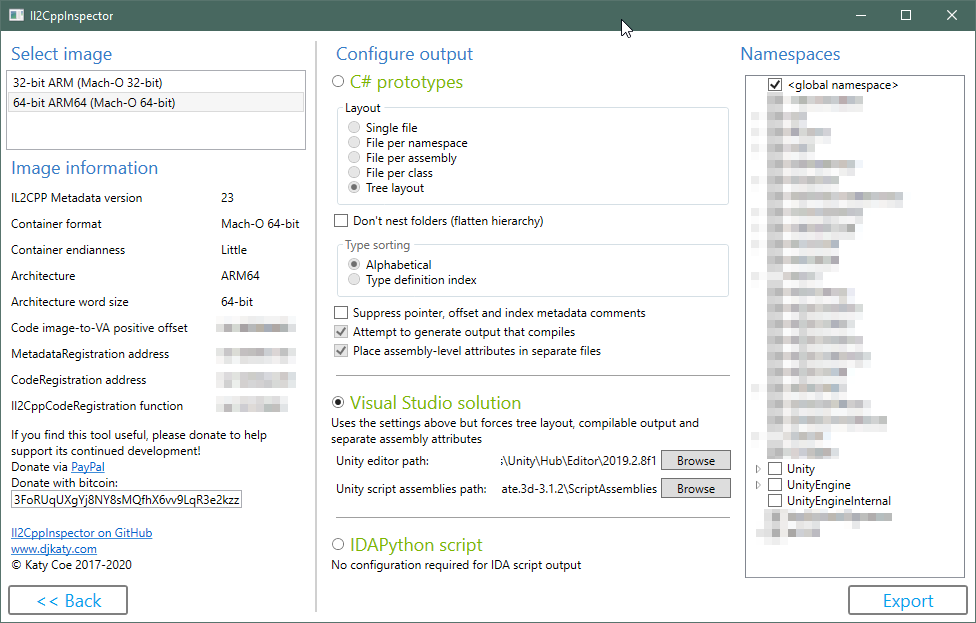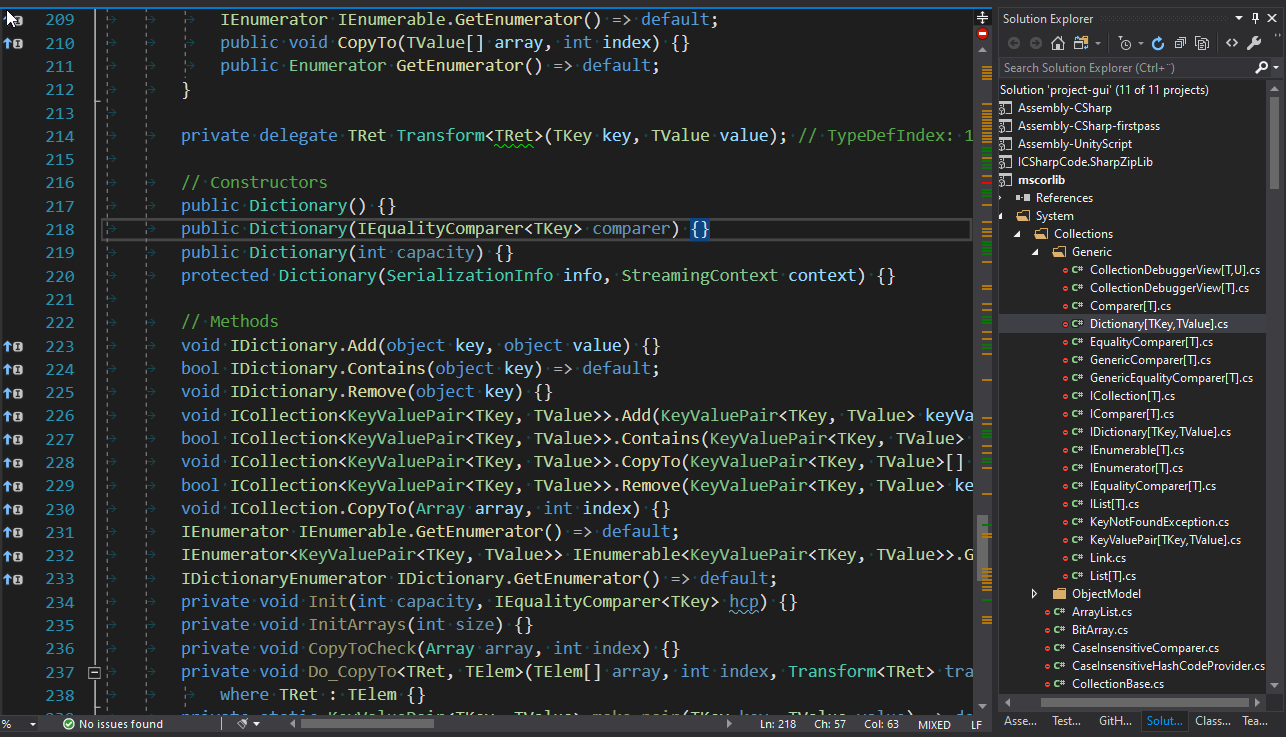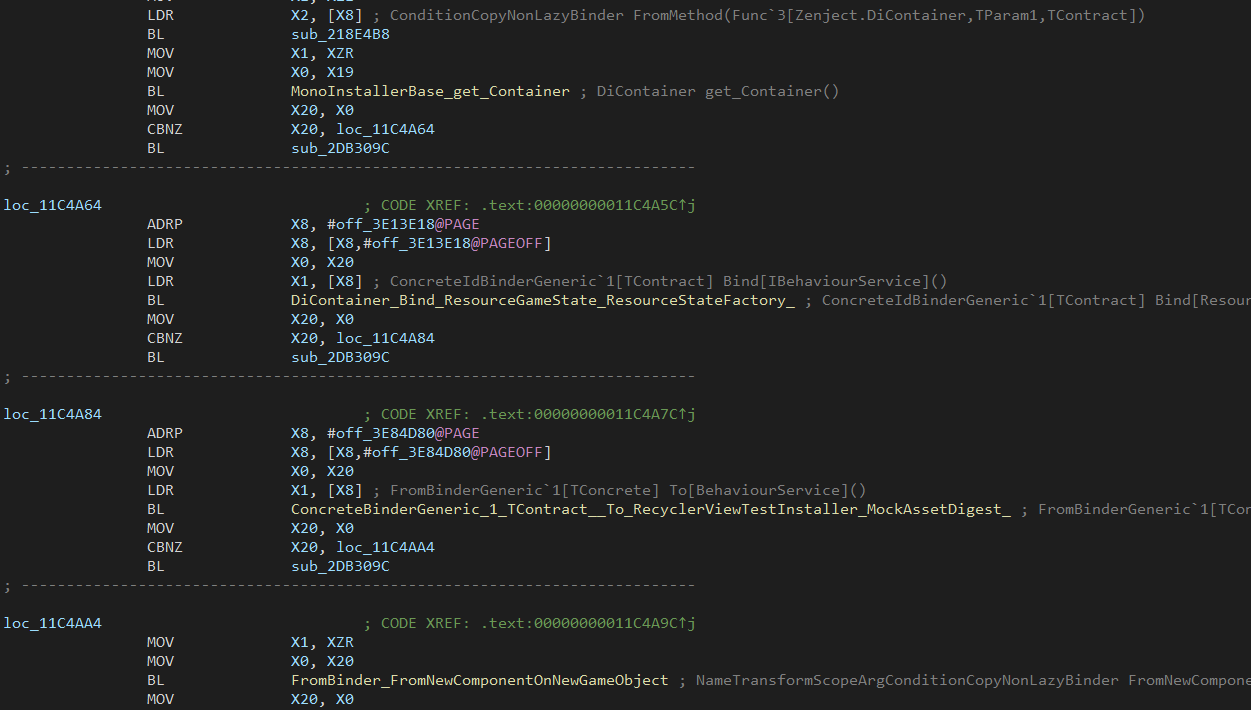Il2CppInspector helps you to reverse engineer IL2CPP applications, providing the most complete analysis available from any public IL2CPP tooling.
Main features:
-
Output IL2CPP type definitions, metadata and method pointers as C# stub code
-
Create Visual Studio solutions directly from IL2CPP files
-
Create IDA Python scripts to populate symbol and function information
-
.NET Reflection-style API to allow you to query the IL2CPP type model, easily create new output modules and integrate Il2CppInspector with your own applications
-
Works on Windows, MacOS X and Linux. Integrated GUI for Windows users
NOTE: Il2CppInspector is not a decompiler. It can provide you with the structure of an application and function addresses for every method so that you can easily jump straight to methods of interest in your disassembler. It does not attempt to recover the entire source code of the application.
File format and architecture support:
- Supports ELF (Android .so), PE (Windows .exe), Mach-O (Apple iOS/Mac), Universal Binary (Fat Mach-O) and FSELF (PlayStation 4 .prx/.sprx) file formats
- 32-bit and 64-bit support for all file formats
- Supports ARMv7, Thumb-2, ARMv8 (A64), x86 and x64 architectures regardless of file format
- Supports applications created with Unity 5.3.0 onwards (full IL2CPP version table below)
Nice to have:
- Support for assemblies, classes, methods, constructors, fields, properties, enumerations, events, interfaces, structs, pointers, references, attributes, nested types, generic types, generic methods, generic constraints, default field values and default method parameter values
- C# syntactic sugar for CTS value types, compiler-generated types, delegates, extension methods, operator overloading, indexers, user-defined conversion operators, explicit interface instantiations, finalizers, nullable types, unsafe contexts, fixed-size arrays, variable length argument lists, method hiding and escaped strings
- Partition C# code output by namespace, assembly, class, full tree or single file; sort by index or type name; output flat or nested folder hierarchy. Each file includes the necessary
usingdirectives. Scope and type name conflicts are resolved automatically to produce code that compiles. - Static and dynamic symbol table scanning and relocation processing for ELF binaries
- Static symbol table scanning for Mach-O binaries
- Automatically defeats certain basic obfuscation methods
Reusable class libraries:
- Il2CppInspector for low-level access to IL2CPP binaries and metadata
- Il2CppModel for high-level .NET Reflection-style access to IL2CPP types and data as a tree model
- Test chassis for automated integration testing of IL2CPP binaries
Class library targets .NET Standard 2.1. Application targets .NET Core 3.0. Built with Visual Studio 2019.
git clone --recursive https://github.com/djkaty/Il2CppInspector
cd Il2CppInspector
dotnet publish -c Release
This will build Il2CppInspector for Windows 64-bit. For MacOS and Linux, add -r xxx to the final command where xxx is a RID from https://docs.microsoft.com/en-us/dotnet/articles/core/rid-catalog
The output binary for command-line usage is placed in Il2CppInspector/Il2CppInspector.CLI/bin/Release/netcoreapp3.0/win-x64/publish/Il2CppInspector.exe.
The output binary for Windows GUI is places in Il2CppInspector/Il2CppInspector.GUI/bin/Release/netcoreapp3.1/win-x64/publish/Il2CppInspector.exe.
Run Il2CppInspector.exe at the command prompt.
File format and architecture are automatically detected.
-i, --bin (Default: libil2cpp.so) IL2CPP binary file input
-m, --metadata (Default: global-metadata.dat) IL2CPP metadata file input
-c, --cs-out (Default: types.cs) C# output file (when using single-file layout) or path (when using per namespace, assembly or class layout)
-p, --py-out (Default: ida.py) IDA Python script output file
-e, --exclude-namespaces (Default: System Unity UnityEngine UnityEngineInternal Mono Microsoft.Reflection Microsoft.Win32 Internal.Runtime AOT JetBrains.Annotations) Comma-separated list of namespaces to suppress in C# output, or 'none' to include all namespaces
-l, --layout (Default: single) Partitioning of C# output ('single' = single file, 'namespace' = one file per namespace in folders, 'assembly' = one file per assembly, 'class' = one file per class in namespace folders, 'tree' = one file per class in assembly and namespace folders)
-s, --sort (Default: index) Sort order of type definitions in C# output ('index' = by type definition index, 'name' = by type name). No effect when using file-per-class or tree layout
-f, --flatten Flatten the namespace hierarchy into a single folder rather than using per-namespace subfolders. Only used when layout is per-namespace or per-class. Ignored for tree layout
-n, --suppress-metadata Diff tidying: suppress method pointers, field offsets and type indices from C# output. Useful for comparing two versions of a binary for changes with a diff tool
-k, --must-compile Compilation tidying: try really hard to make code that compiles. Suppress generation of code for items with CompilerGenerated attribute. Comment out attributes without parameterless constructors or all-optional constructor arguments. Don't emit add/remove/raise on events. Specify AttributeTargets.All on classes with AttributeUsage attribute. Force auto-properties to have get accessors. Force regular properties to have bodies. Suppress global::Locale classes.
--separate-attributes Place assembly-level attributes in their own AssemblyInfo.cs files. Only used when layout is per-assembly or tree
-j, --project Create a Visual Studio solution and projects. Implies --layout tree, --must-compile and --separate-attributes
--unity-path (Default: C:\Program Files\Unity\Hub\Editor\*) Path to Unity editor (when using --project). Wildcards select last matching folder in alphanumeric order
--unity-assemblies (Default: C:\Program Files\Unity\Hub\Editor\*\Editor\Data\Resources\PackageManager\ProjectTemplates\libcache\com.unity.template.3d-*\ScriptAssemblies) Path to Unity script assemblies (when using --project). Wildcards select last matching folder in alphanumeric order
Defaults if not specified:
- bin -
libil2cpp.so - metadata -
global-metadata.dat - cs-out -
types.cs - py-out -
ida.py
To exclude types from certain namespaces from being generated in the C# source file output, provide a comma-separated list of case-sensitive namespaces in --exclude-namespaces. The following namespaces will be excluded if no argument is specified:
System
Mono
Microsoft.Reflection
Microsoft.Win32
Internal.Runtime
Unity
UnityEditor
UnityEngine
UnityEngineInternal
AOT
JetBrains.Annotations
Providing an argument to --exclude-namespaces will override the default list. To output all namespaces, use --exclude-namespaces=none.
For Apple Universal Binaries, multiple output files will be generated, with each filename besides the first suffixed by the index of the image in the Universal Binary. Unsupported images will be skipped.
Simply run Il2CppInspector with the -p switch to choose the IDA script output file. Load your binary file into IDA, press Alt+F7 and select the generated script. Observe the Output Window while IDA analyzes the file - this may take a long time.
Il2CppInspector generates the following data for IDA projects:
- Names for all regular .NET methods
- Names for all constructed generic methods
- Names for all IL2CPP custom attributes generator functions
- Names, .NET argument type lists and C++ signatures for all IL2CPP runtime invoker functions for both regular and constructed generic methods (per-signature Method.Invoke endpoints)
- Function boundaries for all of the above
- Comments at each function entry point with .NET method signatures for all of the above
- Names for all of the following IL metadata references: Type, TypeInfo, MethodDef, FieldInfo, StringLiteral, MethodRef (this includes all generic class and method instantiation metadata)
- Comments for all IL string literal metadata pointers containing the value of the string
- Names for some IL2CPP-specific data structures and functions
Il2CppInspector can create a complete Visual Studio workspace with a solution (.sln) file, project (.csproj) files and assembly-namespace-class tree-like folder structure. Each project creates a single assembly.
Use the --project flag to generate a solution workspace.
In order for Il2CppInspector to be able to create .csproj files which contain the correct Unity assembly references, you must provide the path to an installed Unity editor and a project template or ScriptAssemblies folder of an existing Unity project.
NOTE: The default settings will select the latest installed version of Unity and the latest installed version of the default 3D project template, if they have been installed in the default location.
Typical Unity editor location (specified with --unity-path): C:\Program Files\Unity\Hub\Editor\20xx.y.z
Typical Unity project template location (specified with --unity-assemblies): C:\Program Files\Unity\Hub\Editor\20xx.y.z\Editor\Data\Resources\PackageManager\ProjectTemplates\libcache\<name-of-template>
Typical Unity script assemblies location in existing project (specified with --unity-aseemblies): X:\MyProject\Library\ScriptAssemblies
Replace x, y and z with your Unity version number. Replace <name-of-template> with the desired template.
NOTE: You can use the asterisk wildcard (*) one or more times when specifying these paths. Il2CppInspector will select the last matching folder in alphanumeric order. This is useful if you have multiple side-by-side Unity installs and wish to always select the latest version or template.
In the event that the assembly references are not correctly resolved the first time you load a solution, simply close and re-open the solution to force them to be resolved.
To utilize Il2CppInspector in your own programs, add a reference to Il2CppInspector.Common.dll and add a using statement for the namespace Il2CppInspector.Reflection. See the source code for further details.
Two Powershell scripts are provided to enable easy testing and debugging:
generate-binaries.ps1compiles every C# source file inTestSourcesas a separate assembly and outputs them toTestAssemblies. It then takes every assembly inTestAssembliesand compiles each one as a separate IL2CPP project twice: one for Windows x86 standalone and one for Android into theTestBinariesfolder. It then callsgenerate-tests.ps1.generate-tests.ps1generates a file calledTests.csin theIl2CppTestsproject, containing one test per IL2CPP project inTestBinaries. This file will be compiled by theIl2CppTestsproject. You will then be able to see one test per IL2CPP project in Visual Studio's Test Explorer.
The auto-generated tests generate a file in the test IL2CPP binary's folder called test-result.cs and compares it (whitespace-insensitive) with the corresponding project name cs file in TestExpectedResults. In this way, you can check for files with known structure that the analysis is being performed correctly, or step through the analysis of specific binaries in the debugger without having to change the project's command-line arguments.
| Unity version | IL2CPP version | Support |
|---|---|---|
| 4.6.1+ | First release | Unsupported |
| 5.2.x | 15 | Unsupported |
| 5.3.0-5.3.1 | 16 | Working |
| 5.3.2 | 19 | Untested |
| 5.3.3-5.3.4 | 20 | Untested |
| 5.3.5-5.4.x | 21 | Working |
| 5.5.x | 22 | Working |
| 5.6.x | 23 | Working |
| 2017.x-2018.2 | 24.0 | Working |
| 2018.3-2019.1 | 24.1 | Working |
| 2019.2-2019.3 | 24.2 | Working |
| 2020.1 | 24.3 | Awaiting stable release |
If you have files that don't work or are in an unsupported format, please open a new issue on GitHub and attach a sample with details on the file format, and I'll try to add support. Include both the IL2CPP binary and global-metadata.dat in your submission.
Please check the binary file in a disassembler to ensure that it is a plain IL2CPP binary before filing an issue. Il2CppInspector is not intended to handle packed, encrypted or obfuscated IL2CPP files.
If you found Il2CppInspector useful, you can really help support the project by making a small donation at http://paypal.me/djkaty!
You can also donate with bitcoin: 3FoRUqUXgYj8NY8sMQfhX6vv9LqR3e2kzz
Much love! - Katy
Thanks to the following individuals whose code and research helped me develop this tool:
- Perfare - https://github.com/Perfare/Il2CppDumper
- Jumboperson - https://github.com/Jumboperson/Il2CppDumper
- nevermoe - https://github.com/nevermoe/unity_metadata_loader
- branw - https://github.com/branw/pogo-proto-dumper
- fry - https://github.com/fry/d3
- ARMConverter - http://armconverter.com
- Defuse - https://defuse.ca/online-x86-assembler.htm
The following books were also very helpful:
- Practical Reverse Engineering by Bruce Dang
- Expert .NET 2.0 IL Assembler by Serge Lidin
- The IDA Pro Book, 2nd Edition by Chris Eagle
- The Beginner's Guide to IDAPython by Alexander Hanel
Pizza spinner animation in the GUI made by Chris Gannon - https://gannon.tv/
This software is licensed under AGPLv3.


